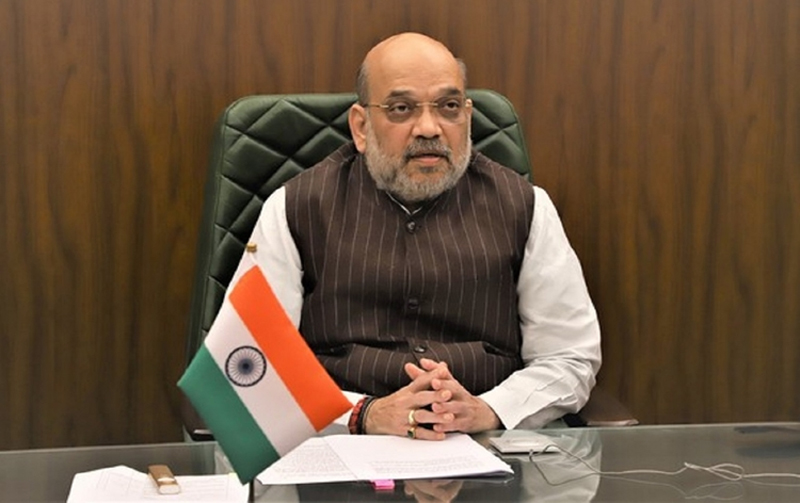Calls for robust internal, border security
*Situation far better in all 3 hotspots
Sanjeev Pargal
JAMMU, Oct 7: Union Home Minister Amit Shah today declared that once three hotspots in the country including Jammu and Kashmir, Left wing extremist areas and North East, will be like any other part of India soon as he declared that zero tolerance strategy and zero tolerance action will have to be added to zero tolerance towards terrorism.
Shah made these remarks while addressing 49th Police Science Congress at Dehradun, Uttarakhand.
“We can say with confidence that after abrogation of Article 370 of the Constitution of India, situation has improved in Jammu and Kashmir and every Indian citizen can now heave sigh of relief that J&K has permanently become part of India and none can do anything there,” the Home Minister said.
Asserting that there were three hotspots in the country—Jammu and Kashmir, Left wing extremist areas and North East, he said at all these places Narendra Modi Government has succeeded in making law and order situation better.
“For a country to develop, it must have robust internal and border security and law and order situation. Situation now has been good in all these three fronts. We have brought many changes from 2019 to 2023 and now there is time to bring them on ground right from the level of Union Home Ministry to Police Station level,” Shah said.
He declared that time has now come to root out terrorism from the country.
“In our counter-terrorism approach, from zero tolerance to terrorism policy, we now have to add zero tolerance strategy and zero tolerance action,” the Home Minister said.
He cited figures of violence in three hotspots during 10 years of UPA Government from 2004-2014 and nine and half years of Narendra Modi Government from 2014 to 2023.
During 2004 to 2014, 33,200 violent incidents took place as against 12358 from 2014-23. Similarly, there were 11947 deaths of civilians and security forces during UPA regime as against just 3244 in last nine plus years of present Government.
Emphasizing the vision of Prime Minister Narendra Modi that India should be number one in the world in every sector by the year 2047, Shah said, “The 49th All India Police Science Congress (AIPSC) has a lot of importance because this is Amrit Kaal’s first Police Science Congress. In these 75 years, we have established stronger roots of democracy. PM Modi has set a target that when we celebrate 100 years of Independence the country should be number one in the world in every sector.”
Shah justified the need to replace the IPC, CrPC and the Evidence Act saying any law becomes ‘out of date’ after 50 years.
“There has been no change in the IPC, CrPC or the Evidence Act since 1860. Any law becomes ‘out of date’ after 50 years. The scale of crime has changed, and so has the method of committing them but there has been no change in the method of dealing with them,” Shah said.
He said this has had a crippling effect on the country’s criminal justice system.
Speaking of the three new legislations — the Bharatiya Nyaya Sanhita (to replace IPC), Bharatiya Nagarik Suraksha Sanhita (to replace CrPC) and Bharatiya Sakshya (to replace the Evidence Act) — under consideration of a Parliamentary panel, he said they will replace the three old codes once passed by the Parliament.
It will expedite disposal of cases as they won’t get inordinately delayed, Shah added.
He said numerous reforms right from the Home Ministry to the last Police Station have been conceived for “Amrit Kaal” and it is the time to implement them on the ground.
The All India Police Science Congress covers six subjects, including policing in the 5G era, narcotics, challenges of social media, community policing, internal security, coordination between police and the Central Armed Police Forces, Shah said.
J&K gets powers for seizure of JKDFP’s assets
The Union Ministry of Home Affairs today delegated powers to the Jammu and Kashmir administration to order seizure of funds, properties and assets of jailed separatist Shabir Shah’s party JKDFP under the Unlawful Activities (Prevention) Act-1967.
A notification empowering State Governments and J&K UT administration to order seizure of funds, properties and assets of the separatist group was issued this evening.
“In exercise of the powers conferred by Section 42 of the Unlawful Activities (Prevention) Act, 1967, the Central Government directs that all powers exercisable by it under Section 7 and Section 8 of the Unlawful Activities (Prevention) Act-1967 shall also be exercised by the State Governments and the Union Territory administration of J&K in relation to the banned outfit,” the order said.
As per Section 42 of the Act, the Central Government is empowered to delegate all or any of powers exercised by it under Sections 6 and 7 of the Act.


